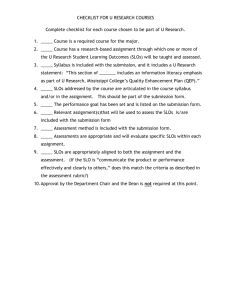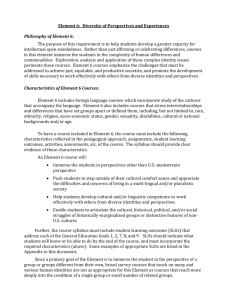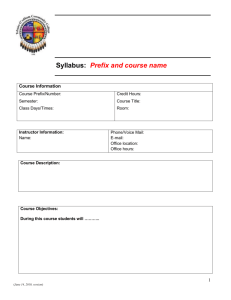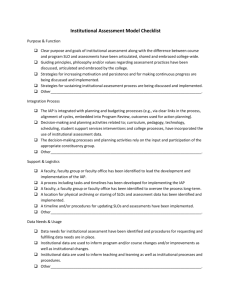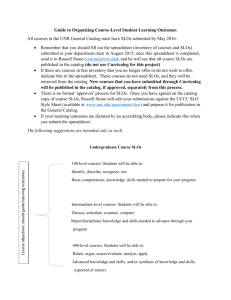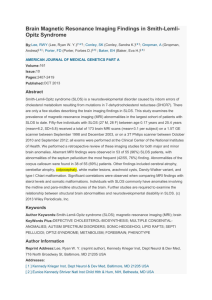GE-10-223.SOC 177. Intimate Relations/Family
advertisement
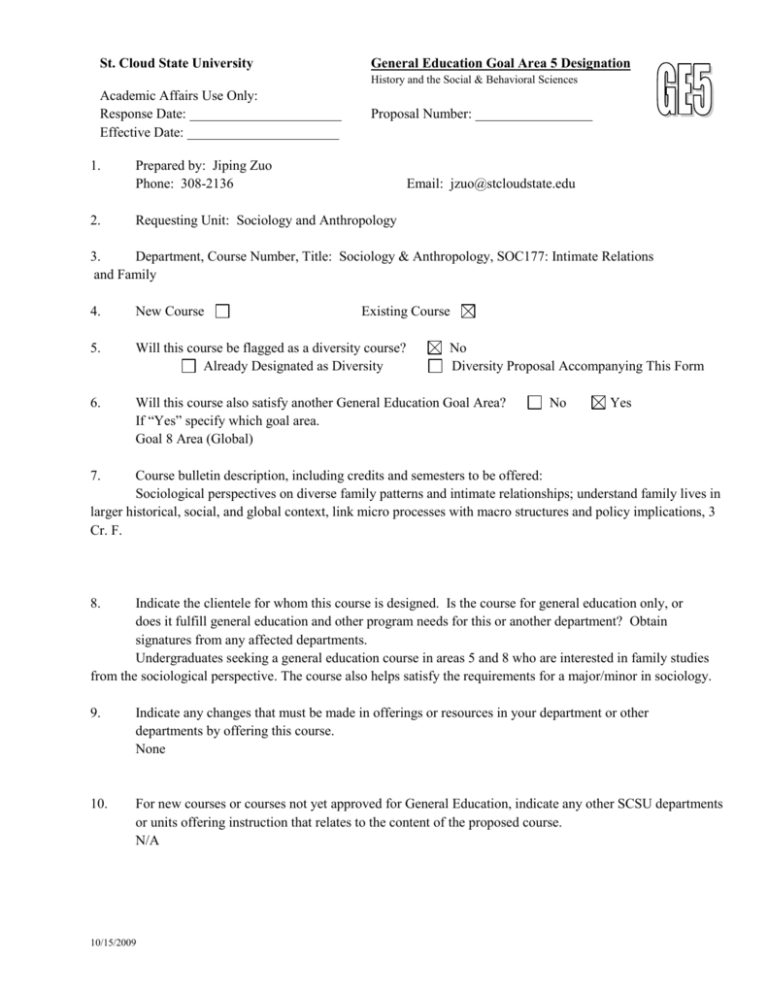
St. Cloud State University General Education Goal Area 5 Designation History and the Social & Behavioral Sciences Academic Affairs Use Only: Response Date: ______________________ Effective Date: ______________________ 1. 2. Proposal Number: _________________ Prepared by: Jiping Zuo Phone: 308-2136 Email: jzuo@stcloudstate.edu Requesting Unit: Sociology and Anthropology 3. Department, Course Number, Title: Sociology & Anthropology, SOC177: Intimate Relations and Family 4. New Course Existing Course 5. Will this course be flagged as a diversity course? Already Designated as Diversity 6. Will this course also satisfy another General Education Goal Area? If “Yes” specify which goal area. Goal 8 Area (Global) No Diversity Proposal Accompanying This Form No Yes 7. Course bulletin description, including credits and semesters to be offered: Sociological perspectives on diverse family patterns and intimate relationships; understand family lives in larger historical, social, and global context, link micro processes with macro structures and policy implications, 3 Cr. F. 8. Indicate the clientele for whom this course is designed. Is the course for general education only, or does it fulfill general education and other program needs for this or another department? Obtain signatures from any affected departments. Undergraduates seeking a general education course in areas 5 and 8 who are interested in family studies from the sociological perspective. The course also helps satisfy the requirements for a major/minor in sociology. 9. Indicate any changes that must be made in offerings or resources in your department or other departments by offering this course. None 10. For new courses or courses not yet approved for General Education, indicate any other SCSU departments or units offering instruction that relates to the content of the proposed course. N/A 10/15/2009 11. Courses designated as General Education are included in the assessment plan for the Goal Area(s) for which they are approved. Courses for which assessment is not included in the annual GE assessment report for two years will be removed from the General Education Program. The Requesting Unit understands and recognizes the above conditions. 12. Provide a concise explanation of how the following goal is a “significant focus” of the proposed course. Goal Area 5: History and the Social & Behavioral Sciences Develop understanding of human societies and behaviors, and of the concepts, theories, and methods of history and the social sciences. This course is designed to (1) equip students with sociological perspectives and analytical tools in examining family lives and changes at both macro and micro levels; (2) sensitize students to diverse family forms and changing family patterns both within and outside the U.S. through a comparative lens; (3) sharpen students' skills of critical thinking by involving them in discussions of various heatedly-debated family issues in American society and on a global scale; (4) further increase students' ability to see family life beyond biological, personal, or moral levels to place it in interactive settings and in historical, social, and global contexts; and (5) enable students to see the interconnectedness between the local and global in understanding personal and family lives. 13. In order for a course to be designated as fulfilling Goal Area 5, it must address at least 4 of the 5 student learning outcomes (SLOs) below. Check the SLOs below that are focused on in the proposed general education course. 1. Describe or use the methods and data by which historians, social scientists, or behavioral scientists investigate human conditions. 2. Analyze human behavior, cultures, and social institutions and processes from the perspectives of history or the social and behavioral sciences. 3. Develop explanations for and explore solutions to historical or contemporary social problems. 4. Reflect upon themselves in relation to family, communities, society, culture, and/or their histories. 5. Apply and critique alternative explanatory systems or theories about human societies and behaviors. 14. Discuss how each Student Learning Outcome checked above is achieved in this course. (Note: Although descriptions of typical assignments or types of assignments may be part of this discussion, it is not appropriate to submit copies of actual assignments.) Students achieve the SLOs through readings, attending lectures, class participation, writing assignments and a variety of other activities outside the class (e.g. conducting mini interviews on a subject of family applying sociological methods, or attending relevant campus-wide academic activities). The teaching emphasizes sociologcal theory and methods; diverse family patterns both in the U.S. and around the world; the importance of explaining various family cultures, family relations and family problems in given historical, social, ecological and global contexts and finding solutions that work for families in varying contexts; students' reflection upon themselves in relation to families in other cultures and different historical periods; critique of alternative theories applyed to different family systems shaped by larger social forces. Students are expected to be able to: 10/15/2009 SLO 1 - Understand basic logic, principles and processes of sociological methods (e.g. qualitative, quantitative, action resarch), and read sumary tables of descriptive statistics on subjects related to family (e.g. breakdown of family poverty rates by race/ehtnicity); SLO 2 - Learn more about similarities and differences in families across cultures (or subcultures) and more importantly, to understand them from historical, social, ecological and global perspectives (e.g. immigrant families compared to non-immigrant families in the U.S.); SLO 3 - Link face-to-face family processes with larger social and historical forces to explain family patterns, trends, and relations in multifaceted contexts and address solutions for family problems in a comprehensive fashion that may involve other social institutions and may do so on a globle scale (e.g. livelihood of family in globalization). SLO 4 - make connections between own family experience and those of others both within and outside their own social circles or cultures, and see own family life in light of larger social problems or social change (e.g. divorce, domestic violence, etc.); SLO 5- grasp the idea that all theories have their strengths and, at the same time, have limitations in scope of application (e.g. structural functionalism, conflict theory, etc.); more importantly, develop ability and analytical skills in critical thinking when evaluating various explanatory sytems, taking into account historical, social, ecological and global contexts (e.g. equity-oriented vs. relation-oriented family exchange theories in different societies). 15. List or attach the Course Outline (adequately described and including percentage of time to be allocated to each topic). Curriculum Committees may request additional information. Topics larger than 20% need to be broken down further. Indicate in your course outline where the Student Learning Outcomes checked above are being met. Family Change and continuity 10% (SLOs #1) Cross-cultural Family patterns and relations 5% (SLOs #1, #2, #3) Sociological theories and methodology in family studies 20% (SLOs #3) Historical perspectives on family change and continuity 10% (SLOs #1) Racial/Ethnic minority family issues 10% (SLOs #1, #2, #3 & #5) Family variations by class and gender 15% (SLOs #1, #2, #3 & #5) Placing family processes in social, economic, ecological contexts 15% (SLOs #1, #3, #5) Understanding U.S. families and families elsewhere as well as interconnectedness of families around the world in a global context 15% (SLOs #1, #2, #3, #4, #5) 10/15/2009
